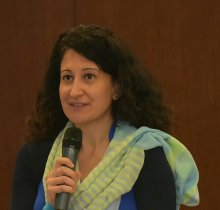Last year a group of 88 investors with combined assets totaling $9.8 tn supported CDP’s Non-Disclosure Campaign (NDC) to call on nearly 700 companies to disclose environmental information.
The investor group has pushed for greater transparency from companies about issues such as climate change, water security and deforestation at companies it sees as having high levels of environmental impact.
Global environmental platform CDP launched the NDC in 2017, with 57 investors taking part. The steady increase in the number of shareholders joining the campaign during the last three years signals that investors are increasingly seeing climate pollution as a risk in financing businesses. Despite the rise in company participation in the NDC, numbers are still low, with 85 percent of companies not answering the request for information.
Going after non-disclosing companies
In 2019, a total of 644 unique companies were sent 758 requests by CDP: 508 for climate change, 154 for water security, 92 for deforestation. This means one company might receive requests to disclose on more than one questionnaire, according to the environmental reporting campaign.
Firms including fashion brand Michael Kors, skin care and cosmetics manufacturer Estée Lauder and Russian fossil fuels giant Novatek have been called on to spell out their carbon emissions.
Emily Kreps, global director of investor initiatives at CDP, says the organization sends letters to thousands of companies in February every year asking them to disclose their environmental information. The disclosure platform opens in April, giving companies until the end of the summer each year to respond. This annual disclosure request has been running since 2003.
‘The NDC runs in parallel to our annual disclosure request, and has been running for the last four years,’ says Kreps, adding that the NDC targets firms that fail to report environmental information by the deadline.
The number of companies targeted rose by 4 percent in 2019 compared with the year before, when 621 firms were asked for disclosure. There was a surge in targeting firms on environmental information right after the 2017 launch of the campaign, with nearly 32 percent more issuers receiving disclosure requests in 2018 than the year before.
The growing number of shareholders pushing for disclosure went a step further last year. For the first time, half of them signed up as lead investors in the campaign and sent letters on behalf of the signatory group to the companies, boosting the number of firms engaged.
‘Over the last year alone, we saw a 20 percent year-on-year increase in corporate disclosure,’ says Kreps. She adds that the harmonization of CDP questionnaires with the standards of the Task Force on Climate-related Financial Disclosure in 2018 has helped drive this growth.
Taming the Wild West of ESG reporting
The investor campaign concluded with extra disclosures representing $2.1 tn in market cap and more than one billion tons of CO2 in emissions in 2019. Of the 644 firms being targeted, however, 547 failed to provide environmental information in 2019.
Ninety-seven companies completed at least one of the questionnaires requested, submitting 111 questionnaires in total across all three themes. This represents a 15 percent response rate of unique company requests, according to the report. More than 40 percent of the companies have never disclosed through CDP before.
Firms releasing data on climate pollution for the first time include India’s largest power utility NTPC, China Shenhua Energy, Chugoku Electric Power Company in Japan, palm oil company Colgate Palmolive India and BayWa, the largest agricultural trader in Germany, reveals the latest report.
Recognizing the growing number of companies disclosing to CDP, Kreps highlights some factors preventing firms from submitting climate reports on time.
‘Just like financial reporting takes due diligence and co-operation between many, if not most, parts of a business, so does non-financial reporting,’ she explains. ‘Completing a disclosure request to CDP – our questionnaires – may take some time and effort depending on the complexity of the business and its environmental initiatives.’
Kreps adds that what companies need to understand about CDP’s disclosure request is that their ‘responses are valued by a growing number of investors that support us, demanding credible, comprehensive sources to inform data-driven decisions.
‘The non-profit uses the influence of investors to drive forward greater accountability and transparency from corporations, and provides the insights for investors – for example, via Bloomberg – to improve financial decision-making and increase corporate engagement.’
Bush fires and Asia spark investor concern
Climate change has continued to attract investors’ interest since 2017, while the number of questionnaires on deforestation sent to companies is on the rise.
More than 500 companies were called on to disclose on climate change in 2019, compared with 419 requests sent out in 2018. Climate change disclosure requests nearly doubled during 2017 and 2018, according to the report.
Twenty-three percent of the companies being targeted are from Asia, excluding Japan, while 21 percent of those being called out by the campaign are based in Oceania.
The 16 percent response rate to questionnaires on deforestation is the highest among the three themes surveyed. Last year, the number of companies receiving questionnaires on this issue more than doubled, with 92 companies receiving a questionnaire in 2019, compared with 34 companies in 2018.
Of the 92 firms, 15 released the requested environmental information, including Estée Lauder and packaging company Avery Dennison, according to the report.
Separately, investor interest in water security saw a 36 percent drop in the number of companies engaged. This is largely due to the majority of water engagements in previous years being led by a single investor that took a more focused approach in 2019, the environmental report concludes.










